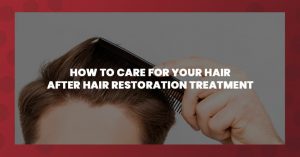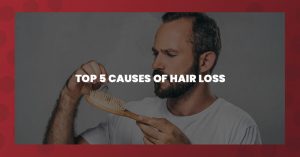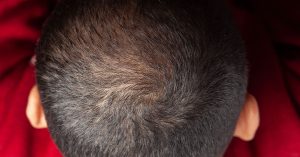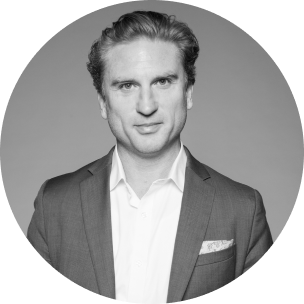What we eat has a profound impact on every aspect of our health and wellbeing. How well our hair grows is no exception. A healthy diet feeds a healthy scalp, which in turn is more likely to grow healthy hair.
Although factors like family history, genetics, stress, and medical conditions may have a stronger influence on hair growth and hair loss… your diet is an essential component in your hair’s health. If your diet is lacking in nutrients or full of unhealthy foods, you may be able to reduce hair shedding and to promote hair growth by adding or eliminating certain foods.
Can Diet Cause Hair Thinning?
A poor diet can cause telogen effluvium, a type of hair loss characterized by excessive shedding and overall hair thinning. When essential nutrients are lacking, the hair’s growth cycle is stunted during its telogen (resting) phase, and new hairs grow back slowly or not at all. In the meantime, existing hair may shed at a greater-than-usual rate.
Diet and hair loss are also connected through extreme (or crash) dieting for weight loss because it can be problematic for the hair and scalp. Diets that don’t provide the right balance and amount of nutrition may result in telogen effluvium. Hair growth is a relatively low priority for the body. When your diet doesn’t produce an adequate amount of energy from the food you consume, your energy will be allocated to bodily functions that are more important than hair growth.
What Is Your Diet Lacking If Your Hair is Falling Out?
Excess hair shedding can result from inadequate nutrition in general, or from a lack of specific nutrients like protein, zinc, or calcium – all necessary for a healthy scalp and hair. Iron deficiency is also implicated in hair loss and poor hair growth. Vegans and vegetarians may need to supplement their plant-based diets in order to maintain adequate iron levels.
What Vitamin Deficiency Causes Hair Loss?
Some vitamin deficiencies may cause hair loss as well. Vitamin B12, riboflavin, folate, and biotin are all building blocks of healthy hair – and therefore involved in the links between diet and hair loss.
What Foods Cause Your Hair to Fall Out?
The bad news is some of our favorite foods can contribute to hair loss. Foods with elevated levels of mercury, high on the glycemic index, high in saturated fats, or high in processed sugar are especially bad for the hair and scalp.
Excess mercury in the diet builds up in the hair causing increased shedding and thin, brittle strands. Most dietary mercury comes from consuming certain types of fish – particularly when eaten in raw sushi. Marlin, Mackerel, Tilefish, Swordfish, Orange roughy, Chilean sea bass, Shark, and Tuna may contain high levels of mercury and should be consumed sparingly.
High glycemic index foods like sugar, sugary foods and drinks, white bread, potatoes, and white rice increase oil production in the scalp. They cause inflammation and irritation – leading to changes in blood supply to the scalp – which in turn negatively affects hair growth. Processed sugar is especially problematic and should be avoided whenever possible.
Fried food and other foods high in saturated fat increase oil production and free radicals that damage cells necessary for hair growth. Some foods that contain saturated fats are butter, cheese, sausage, bacon, cured or fatty meats, cakes, and biscuits.
Alternatively, it’s also possible to have too much of a good thing. Too much vitamin A or vitamin E may contribute to hair loss, as can too much selenium. When taking dietary supplements, it’s always important to ensure that you’re not taking more than the recommended daily allowance of any vitamin or mineral.
Can Diet Related Hair Loss Be Reversed?
Fortunately, most diet-related hair loss is temporary and reversible. When you eat a balanced diet with adequate amounts of healthy foods, hair shedding will decrease – and normal growth will resume.
Because of the length of hair’s growth cycle, it won’t happen overnight though… taking about six months to reverse. In the meantime, consider treatments to stimulate hair growth and counteract the impacts of an unbalanced diet.
Hair Center of Nebraska Can Uncover the Cause of Your Hair Loss
If you are experiencing hair loss that does not respond to a change in your diet, contact The Hair Center of Nebraska to set up a consultation. We will help determine the cause of your hair loss and discuss treatments that may preserve or enhance your existing hair – or address permanent hair loss. When you set up a consultation, you are taking the first step on your journey to a better life and a fuller head of hair. Contact us to set up your appointment!






